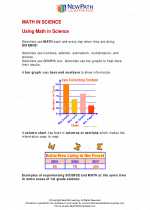Chemistry
Chemistry is the study of matter, its properties, how it interacts, and the changes it undergoes. It is often referred to as the "central science" because it connects other natural sciences such as biology, physics, and environmental science.
Key Topics in Chemistry:
- Atomic Structure
- Chemical Reactions
- Elements and the Periodic Table
- Acids and Bases
- States of Matter
- Chemical Bonding
Atomic Structure:
Atoms are the basic building blocks of matter. They consist of a nucleus containing protons and neutrons, surrounded by electrons in energy levels. Understanding atomic structure is crucial to understanding chemical reactions and the behavior of elements.
Chemical Reactions:
Chemical reactions occur when substances interact to form new substances. This can involve the breaking and forming of chemical bonds. Understanding chemical reactions helps us understand processes such as combustion, photosynthesis, and corrosion.
Elements and the Periodic Table:
Elements are pure substances that cannot be broken down into simpler substances by chemical means. The periodic table organizes the elements based on their atomic structure and properties. It allows us to predict the behavior of different elements and their compounds.
Acids and Bases:
Acids and bases are two important categories of chemicals. Acids have a pH less than 7 and can donate protons, while bases have a pH greater than 7 and can accept protons. Understanding acids and bases is important in fields such as medicine, environmental science, and industry.
States of Matter:
Matter can exist in different states: solid, liquid, and gas. Understanding the behavior of matter in different states is essential for fields such as material science, thermodynamics, and environmental studies.
Chemical Bonding:
Chemical bonding is the process by which atoms combine to form molecules and compounds. Different types of chemical bonds, such as ionic and covalent bonds, determine the properties of substances. Understanding chemical bonding is crucial for fields such as materials engineering, biochemistry, and pharmacology.
Study Guide for Chemistry:
- Review the periodic table and learn the properties of different elements.
- Practice balancing chemical equations to understand chemical reactions.
- Experiment with acids and bases to observe their effects.
- Observe and document the properties of different states of matter in everyday life.
- Learn about the structure of the atom and how it determines the behavior of elements.
- Explore the concept of chemical bonding through models and visual aids.
[Chemistry] Related Worksheets and Study Guides:
.◂Science Worksheets and Study Guides First Grade. Math in Science

 Worksheet/Answer key
Worksheet/Answer key
 Worksheet/Answer key
Worksheet/Answer key
 Worksheet/Answer key
Worksheet/Answer key
